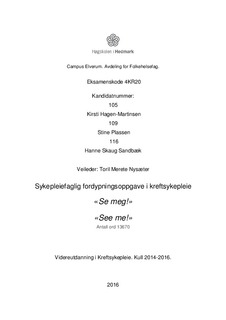| dc.contributor.author | Hagen-Martinsen, Kirsti | |
| dc.contributor.author | Plassen, Stine | |
| dc.contributor.author | Sandbæk, Hanne Skaug | |
| dc.date.accessioned | 2016-09-21T06:05:47Z | |
| dc.date.available | 2016-09-21T06:05:47Z | |
| dc.date.issued | 2016 | |
| dc.identifier.uri | http://hdl.handle.net/11250/2408976 | |
| dc.description | Fordypningsoppgave i kreftsykepleie, 2016 | nb_NO |
| dc.description.abstract | Bakgrunn: I Norge mister rundt 700 barn årlig mor eller far i kreft (2012). Vår erfaring fra praksisfeltet, er at det er mye usikkerhet blant personalet da vi får kreftsyk forelder med barn til avdelingen. Hvordan tilnærme seg barnet? Hvordan samhandle med barnet, for at barnet skal føle seg trygt og oppleve mestring?
Hensikt: Å avdekke hvordan kreftsykepleier med sine egenskaper og kunnskaper best kan legge til rette for samhandling med barnet, for å vinne tillit, skape trygghet og øke barnets mestringsevne i situasjonen som pårørende, på fritiden og etter oppholdet på lindrende enhet.
Problemstilling: Hvordan kan kreftsykepleier skape trygghet gjennom samhandling med barn som pårørende på lindrende enhet, slik at barnet opplever mestring?
Metode: Oppgaven er en litteraturstudie basert på allerede eksisterende kunnskap og egen erfaringsbasert kunnskap. Funn/diskusjon: Funn viser at kreftsykepleier trenger gode kommunikasjonskunnskaper og personlig egnethet i møte med barnet (og deres familie). Dette for å skape tillit og trygghet på veien mot mestring. Barn ønsker å bli inkludert i foreldres sykdom, og ønsker primært informasjon fra sine foreldre. Men kreftsykepleier kan være en god støtte for dem i situasjonen.
Konklusjon: Kreftsykepleier har en sentral rolle i å trygge barn som pårørende, men vi ser at et bredt tverrfaglig samarbeid er viktig for å ivareta barnet, den syke og den friske forelder. Vi ser et stort behov for å systematisere oppfølgingen, og savner et pålagt ansvar for barneansvarlig i kommunehelsetjenesten. Vi mener funnene i oppgaven er overførbare til annet helsepersonell, og til andre diagnoser der barn er pårørende. | nb_NO |
| dc.description.abstract | Abstract: Background: 700 children lose a parent annually in Norway (2012). The experience we have from our field of practice is that there is a great deal of insecurity amongst the staff when we encounter children of a cancer-ridden parent on the ward. How do we approach the child? How do we interact with the child so that it feels secure and able to cope with the situation?
Purpose: To uncover how oncology nurses with their characteristics and knowledge can interact to create an atmosphere of trust, security and increase the child’s coping skills in their role as dependant, in their leisure time and after their stay in a palliative unit.
Problem: How can the oncology nurse create an atmosphere trust through interaction with the dependent child in the palliative unit, such that the child develops coping skills?
Findings/discussion: Finds show that oncology nurses are in need of good communication skills and personal characteristics in the interaction with children (and their families). This is important for instilling trust and security for coping. Children wish to be included in their parents’ sickness, and wish primarily information from their parents, but the oncology nurse can be a good support for them in this situation. Conclusion: The oncology nurse plays an important role in helping dependant children as to feel safe, but we see that a broad interdisciplinary cooperation is important to safeguard the child, the affected and the healthy parent. We see a great need to systematize care, and want an imposed responsibility to coordinate care by the municipal health care services for children. We feel that what we have found in our study is transferable to other health care workers and to other diagnoses of parents where dependent children are involved. | nb_NO |
| dc.language.iso | nob | nb_NO |
| dc.subject | trygghet | nob |
| dc.subject.mesh | kreftsykepleie | nob |
| dc.subject.mesh | Oncology Nursing | eng |
| dc.subject.mesh | barn | nob |
| dc.subject.mesh | children | eng |
| dc.subject.mesh | pårørende | nob |
| dc.subject.mesh | Family | eng |
| dc.subject.mesh | samarbeid | nob |
| dc.subject.mesh | Cooperative Behavior | eng |
| dc.subject.mesh | mestring | nob |
| dc.subject.mesh | Coping Behavior | eng |
| dc.title | «Se meg!» | nb_NO |
| dc.title.alternative | «See me!» | nb_NO |
| dc.type | Student paper, others | nb_NO |
| dc.subject.nsi | VDP::Medical disciplines: 700::Health sciences: 800::Nursing science: 808 | nb_NO |
| dc.source.pagenumber | 86 s. | nb_NO |
